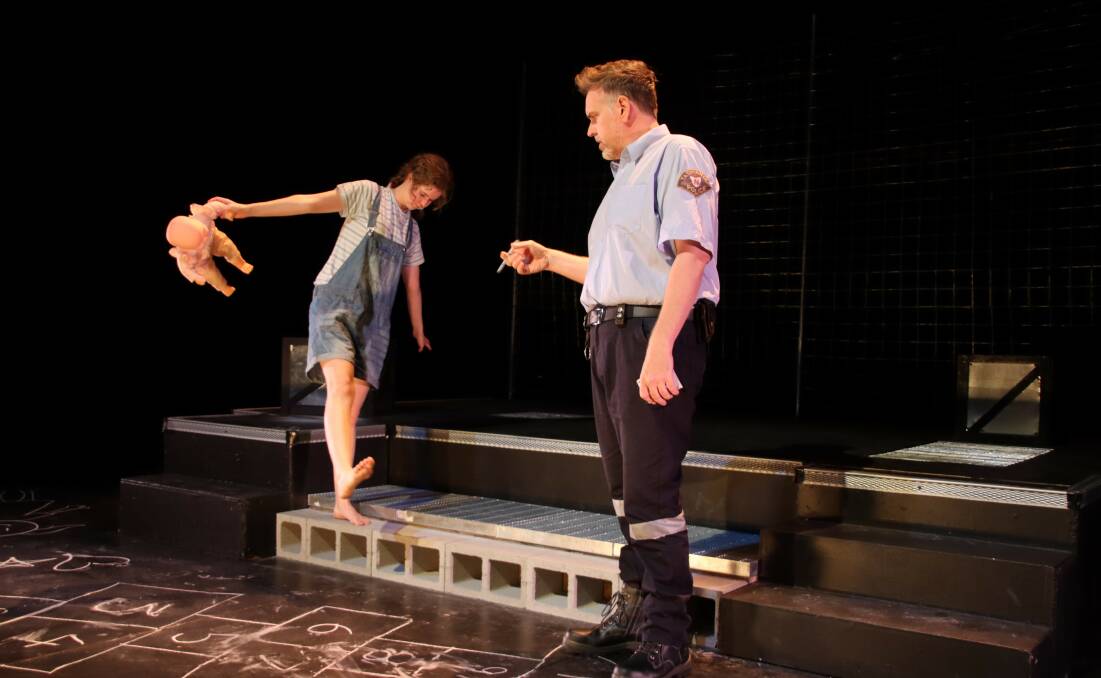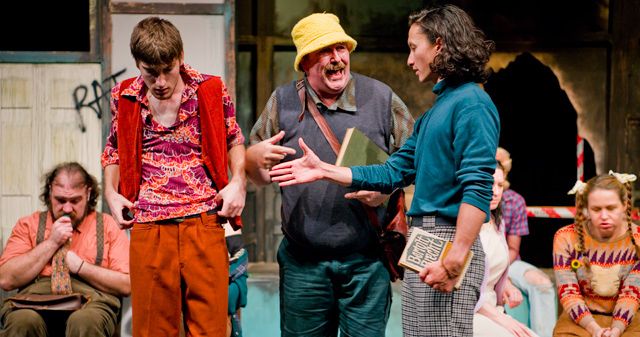 |
| Rachel Pengilly and Craig Alexander in Echo theatre's production of Wolf Lullaby |
It's been a long time, but the theatres are open again and it is a delight to be back. I am trying to see what I can, dependent on my other commitments, and I shall try to report back (in chronological order).
- Wolf Lullaby - Echo theatre, Queanbeyan Performing Arts Centre: Written by Hilary Bell, this is a play that asks, 'Is there intrinsic evil in the world?' When a young child is murdered in a small town, suspicion falls on nine-year-old Lizzie, played with alarming credibility by Rachel Pengilly. Her young parents (Natasha Vickery and Joel Horwood) are naturally confronted by the dawning realisation that their child may be capable of such a crime, and grapple with the fact that in some sense they created her (the father even goes so far as to ask if she is really his - tainted blood, and all that). When is one old enough to know the difference between right and wrong; storytelling and lies; boundaries and empathy? And how can one learn when presented with such conflicting role models (the arresting office, Ray is a fantastically flawed character - a dream part for an actor and one which Craig Alexander clearly relishes)? There could be an element of sensationalism with such material (and those with memories of James Bulger in the U.K. and Derrick Robie in the U.S.A. might be tempted to avoid its visceral memories), but Jordan Best directs in the shadowy grey areas of nuance and suggestion, which is where she is at her most creative. This production is not lurid in any way, but it is deeply disturbing on many levels.
- Cat on a Hot Tin Roof - Canberra Repertory Theatre, Theatre 3: In the spirit of full disclosure I must admit that I don't really like Tennessee Williams' plays - I find them mean-spirited and whiny, without any warmth or sensitivity and I dislike his vindictive portrayal of women. Having said that, this is a good production, directed with pace by Anne Somes. The lead actors play out their drama well on a set by Cate Clelland, which evokes the heat and the irritation of the situation (although the lighting design is distracting and, while though very close to Williams' initial premise, it proves that a writer doesn't always know what is best for their play). Victoria Dixon plays Maggie, the titular cat, with frustration and boredom, biding her time and knowing exactly when to unsheathe her claws; Michael Sparks is strong as an unsympathetic Big Daddy and Liz St Clair Long has fun flitting about the stage with restless insecurity. The clear standout here is Teig Sadhana who shines in the difficult role of Brick, capturing angst, depression, frustration and self-loathing, while getting steadily drunk and remaining coherent. He radiated the appropriate amount of pain and self-pity, with a convincing energy, as he portrayed a former athlete who had been broken mentally and physically. While he remained a deeply flawed and unpleasant character, he never tried to deliberately win sympathy or ‘entertain’ us, which gave the character depth and realism.
- Ben Elton Live 2021 - Canberra Theatre Centre: I'm including comedy in this review, because it is one of the first things to return to the stage, and also because I bought tickets for this gig about 18 months ago and am so excited it’s finally here. I first saw Ben Elton 30 years ago when I was a student in Manchester. I’ve seen him on nearly every tour since. I promise I’m not a stalker. I agree with others: he’s no longer an angry young man; rather a grumpy old git, and his material has aged with him. He is more self-aware than most of his audience (‘if you think you’re still 21 inside, ask an actual 21 year old’) and provides an informed and entertaining interpretation of the development of comedy in context. He’s still sharp and topical, and knows how to write things to make us think, and realise how little we know.
- Cosi - Canberra Repertory Theatre, Theatre 3: This is the first time I've ever seen Louis Nowra's Australian classic about an idealistic young man trying to put on an ambitious production of Cosi fan Tutte in a psychiatric facility with patients who can't speak Italian. Or sing. It's got a lot to recommend it, most notably the sensitive direction from Sophie Benassi combined with some great performances. Chris Baldock was entirely committed to his portrayal of Roy (and I don’t just mean in that ghastly haircut and costume). He maintained a consistency in his gestures and ticks that felt genuine and not excessive. Perhaps the true testament to his acting was that I was more interested in the person than the illness, and I feel that captures the essence of the play more than any other accolade. Max Gambale as Henry had the strength to portray a role that was largely non vocal and to make him interesting and appealing, with sensitivity when required – his outburst over the Viet Cong and his presentation of the toy soldiers towards the end of the play felt a little like set pieces, but the pay-off was well earned. All the female characters are underwritten and Ruth is one of the hardest roles to play - Alex Pelvin played her with such aching calm and continuity that she became the most realistic of the characters on stage. Her quiet questioning of every detail was clearly reflected in her dedication to the integrity of the role and her natural warmth translated into her being the one person I really wanted to watch. Meanwhile Steph Roberts was good at capturing the mood changes and personality shifts in Cherry's character, but she occasionally strayed into caricature and played lines for laughs rather than truth. There is an inherent problem with amateur productions of plays about amateur thesbians in that it can be difficult to discern the difference between the 'good' and the 'bad' acting, and this was evident on some occasions. On the whole, however, it was affirming: in a world of political divisions, individual preoccupations, performance anxiety and patriarchal expectations of 'normality', we discover that what really matters is truth, connections and love.
- Adam Hills: Shoes Half Full - Canberra Theatre Centre: Adam Hills is living proof that you can be a decent chap and still be bloody funny. He is inclusive and witty, highlighting his own inadequacies rather than belittling anyone else - he is happy enough to show us his prosthetic leg, to take it off, and admit that he would really have liked to have been born with two feet. His rapport with the audience is such that he even has the house lights slightly up so that he can engage more with us. He respects his fans from the deaf community and gets a laugh out of his sign language interpreter when he tells one of his more ribald or accent-related stories. I have heard some of these anecdotes before on previous televised tours or on The Last Leg but they are genuinely amusing due to the fact that he seems to get a real kick out of life (if you'll pardon the pun: I'm sure he would). Having lived in both countries and understanding the humour, highlights and cultural differences between them, he spans my UK/AUS divide perfectly (not a euphemism).
 |
| The cast of Canberra Repertory's Cosi |

